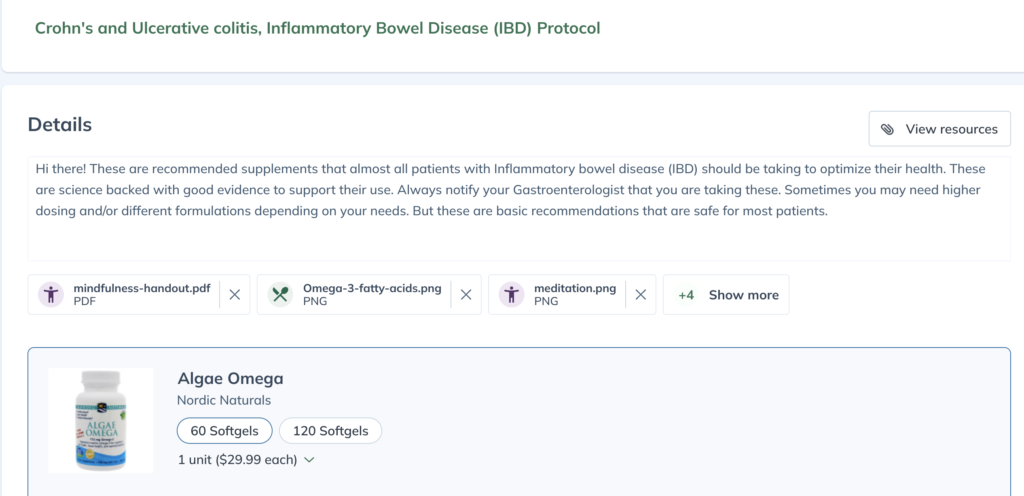Ok, so supplements are all the rage these days and it always feels like someone is trying to sell you something. On top of that, you can’t even walk out of a health food store without being bombarded with aisles of options for supplements, leaving you feeling with the FOMO (fear of missing out) on some health benefit.
When you have inflammatory bowel disease (IBD) such as Crohn’s or ulcerative colitis, there’s already so much going on in your life and you are likely already taking many medications, that adding more pills just doesn’t sound like fun. Thankfully, there really aren’t that many supplements you should actually be taking. Especially, when you’re thinking about taking supplements within the realms of what the science shows is of most benefit.
The question I get on the daily
But I get this question ALL.THE.TIME from patients about what supplements they should be taking. And then the next question is where they should be getting them. Because these are all available over the counter, for a long time, I would just hand people a list and say “good luck”! That was before I realized so many supplements out there are not tested for quality/purity and there are even “fake” products out there, including on big websites like Amazon.
My solution
So I have made a list and also have a link for you to be able to access high grade products that have been tested by third party organizations to validate their quality.
Here is my list of recommended supplements that almost all patients with Inflammatory bowel disease (IBD) should be taking to optimize their health. These are science backed with good evidence to support their use.
As a note, it’s always a good idea to notify your Gastroenterologist that you want to take these and ask them if there is any reason not to. Sometimes you may need higher dosing and/or different formulations depending on your needs. But these are basic recommendations that are safe for most patients.
What supplements to take
- Vitamin D – For most people it doesn’t really matter if you take D2 or D3 but aim to take at least 2,000IU or 50mcg once daily. Most people are low in vitamin D but especially patients with ulcerative colitis or Crohn’s. We know that low levels of vitamin D have been found to increase your risk of a flare and possibly increase your risk of colon cancer.
- Omega 3 oil – get it directly from the source and choose an omega 3 formulation made from algae of at least 250mg daily.
- Vitamin B12 – especially if you are more plant based, vegan or vegetarian. And if you have Crohn’s or ulcerative colitis, you can also become deficient for a number of reasons including prior surgeries altering your anatomy or inflammation of the gut all affecting your absorption of the vitamin. You should be taking at least 1,000mcg once daily.
- Turmeric – Anywhere from 500mg daily to 1,000mg twice daily. Some of this depends on the amount of the active ingredient curcumin in the brand you purchase and if you can tolerate higher doses (some people get an upset stomach with higher doses). But just even a small amount of turmeric in your life is a good idea. One thing to note is that often turmeric supplements also contain black pepper extract to increase your body’s absorption of turmeric.
High grade supplements
Signup at this link or click on the pics below for access to my favorite supplements and get a 10% discount on MSRP. On top of that, you get FREE ACCESS to other helpful handouts on the following topics that have you will find helpful in Crohn’s and ulcerative colitis:
- Omega-3 Fatty acids
- Tips to incorporate mindfulness
- A 5 step meditation exercise
- Yoga Poses for Digestion
- Stress in the Body
- All things Vitamin B12
References:
Fletcher, J., Cooper, S. C., Ghosh, S., & Hewison, M. (2019). The role of vitamin D in inflammatory bowel disease: mechanism to management. Nutrients, 11(5), 1019
Hanai, H., Iida, T., Takeuchi, K., Watanabe, F., Maruyama, Y., Andoh, A., … & Koide, Y. (2006). Curcumin maintenance therapy for ulcerative colitis: randomized, multicenter, double-blind, placebo-controlled trial. Clinical Gastroenterology and Hepatology, 4(12), 1502-1506.
Hwang, C., Ross, V., & Mahadevan, U. (2012). Micronutrient deficiencies in inflammatory bowel disease: from A to zinc. Inflammatory bowel diseases, 18(10), 1961-1981.
Iqbal, U., Anwar, H., & Quadri, A. A. (2018). Use of curcumin in achieving clinical and endoscopic remission in ulcerative colitis: a systematic review and meta-analysis. The American journal of the medical sciences, 356(4), 350-356.
Kilby, K., Mathias, H., Boisvenue, L., Heisler, C., & Jones, J. L. (2019). Micronutrient absorption and related outcomes in people with inflammatory bowel disease: a review. Nutrients, 11(6), 1388.
Meeker, S., Seamons, A., Maggio-Price, L., & Paik, J. (2016). Protective links between vitamin D, inflammatory bowel disease and colon cancer. World journal of gastroenterology, 22(3), 933.


+ show Comments
- Hide Comments
add a comment